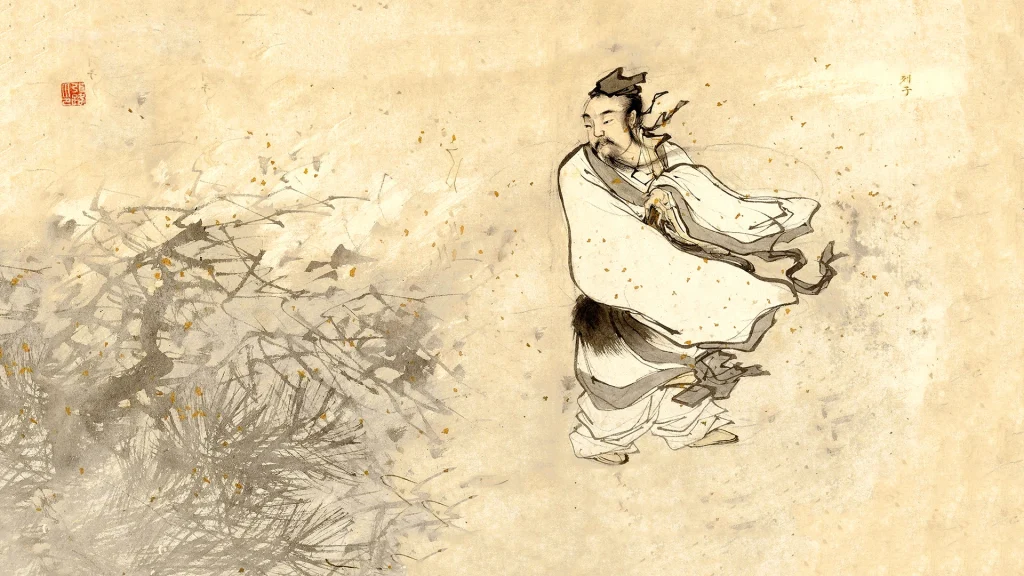
Before Laozi was Zhuangzi, before Zhuangzi was Liezi.
The teachings of Liezi, a Taoist philosopher and writer who lived during China’s Warring States period, remain as relevant and insightful as ever, offering us a valuable source of wisdom and guidance for navigating the complexities and challenges of the modern world. This post explores the life and works of Liezi and the principles of Taoist philosophy that he wrote down for us.
Life and Works
Liezi’s life and works are shrouded in mystery and legend, but scholars generally agree that he lived during the fourth century BCE. His work, the “Liezi,” is a collection of stories and parables that illustrate the principles of Taoist philosophy, and has had a profound impact on Chinese culture and philosophy.
Liezi was said to have been a contemporary of Zhuangzi, or perhaps a precursor because Zhuangzi’s works refer to Liezi, he certainly influenced his teachings. Despite the similarities between their works, however, Liezi’s “Liezi” takes a more optimistic and humanistic view of the world, emphasizing the importance of cultivating inner virtue and wisdom rather than seeking to escape the world’s troubles through detachment or disengagement.
Principles of Taoist Philosophy
At the heart of Liezi’s philosophy is spontaneity, living in a natural, unforced manner, and letting go of attachment to artificial or externally imposed systems of thought. This principle is particularly relevant today when we are so bombarded by external pressures and expectations that can stifle our creativity and undermine our sense of validity.
Liezi also emphasized the importance of living in harmony with the natural world and believed that by cultivating this deep sense of connection we could live a more fulfilling and meaningful existence. This emphasis on harmony with nature is particularly relevant now as we face growing ecological crises and environmental degradation.
The Importance of Morality and Ethics
Liezi’s teachings on the importance of morality and ethics offer us a valuable guide to living a life of purpose and meaning. In a world that often seems rife with greed, selfishness, and moral ambiguity, he reminds us of the importance of cultivating our unique moral nature and living in accordance with true values and principles.
For Liezi, the ultimate goal of life was not to achieve material success or status but to cultivate one’s own inner Sage. By doing so, we can live a life of peace and contentment, free from the distractions and temptations of the external world. This emphasis on inner virtue and wisdom is particularly relevant today when we are often bombarded with external pressures and distractions that can undermine our sense of self and purpose.
Authenticity
The legacy of Liezi offers us a powerful call to embrace wisdom and grace in our lives. By engaging with his philosophy, we can learn to let go of our attachment to rigid systems of thought and embrace a more spontaneous and open way of being. We can learn to cultivate a deeper sense of connection and harmony with nature, and to live a life of purpose and meaning, guided by our inner moral compass.
Liezi’s teachings remind us of the importance of cultivating our own inner wisdom and virtue and living in accordance with our own values and principles. By doing so, we can achieve a sense of peace and contentment, and live a life of purpose and meaning that is grounded in authenticity.
Conclusion
The teachings of Liezi and his fellow Taoist sages offer us a valuable source of guidance and inspiration, as we seek to navigate the challenges and complexities of modern life. These principles of Taoist philosophy can help us to find our way amidst the noise and confusion, and to cultivate a sense of inner peace and contentment that is grounded in inner wisdom and virtue.
While Liezi’s life and works remain shrouded in mystery and legend, his teachings have had a profound impact on Chinese culture and philosophy, and continue to resonate all around the world. As we grapple with the pressing issues of our time, from environmental degradation to social inequality and political turmoil, Liezi’s teachings remind us of the importance of cultivating inner wisdom and virtue and living in accordance with our values and principles.
Whether we are seeking to find our way amidst the complexities of our personal lives or to make a positive difference in the world around us, Liezi’s teachings offer us a valuable guide to living a life of purpose and meaning, grounded in authenticity. By embracing the principles of Taoist philosophy and cultivating inner wisdom and virtue, we can become agents of positive change in the world, and lead lives that are truly fulfilling and meaningful.
The teachings of Liezi offer us a powerful reminder of the importance of living in harmony with nature, cultivating inner wisdom and virtue, and embracing a spontaneous and open form of being. As we navigate complexities and challenges, we can draw on the insights and wisdom of the Taoist sages, including Liezi, to help us find our way and live lives that are truly authentic, fulfilling, and meaningful.

